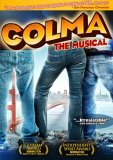| Reviews & Columns |
|
Reviews DVD TV on DVD Blu-ray 4K UHD International DVDs In Theaters Reviews by Studio Video Games Features Collector Series DVDs Easter Egg Database Interviews DVD Talk Radio Feature Articles Columns Anime Talk DVD Savant Horror DVDs The M.O.D. Squad Art House HD Talk Silent DVD
|
DVD Talk Forum |
|
|
| Resources |
|
DVD Price Search Customer Service #'s RCE Info Links |
|
Columns
|
|
|
Colma: The Musical
Lionsgate Home Entertainment // R // November 20, 2007
List Price: $27.98 [Buy now and save at Amazon]
 I've never been to Colma, the sleepy town just outside San Francisco, and you probably haven't, either. But in a way, we have. For Colma is just another American town where the best employment opportunities are either in retail or in another town, where the only thing to do is hang out at the mall, where escape to anywhere else is the dream of every high schooler anticipating that moment of eventual freedom. The city's claim to fame is that it is a necropolis, and the dead outnumber the living thousands to one - an apt metaphor for a town with nothing to do and nowhere to go.
I've never been to Colma, the sleepy town just outside San Francisco, and you probably haven't, either. But in a way, we have. For Colma is just another American town where the best employment opportunities are either in retail or in another town, where the only thing to do is hang out at the mall, where escape to anywhere else is the dream of every high schooler anticipating that moment of eventual freedom. The city's claim to fame is that it is a necropolis, and the dead outnumber the living thousands to one - an apt metaphor for a town with nothing to do and nowhere to go.Few movies have captured this sort of small town teenage malaise like the new pop-rock indie masterwork "Colma: The Musical," which plays as both a biting satire of the late teen years and a knowing, heartbreaking coming of age saga. Unquestionably one of the smartest movies in recent memory, "Colma" is so blazingly original that it bursts off the screen with the sort of breathtaking energy that reminds you why you love movies in the first place.
We're hooked from the first bar of music. The opening song, "Colma Stays," sets the stage, introducing us to Colma as just another suburban wasteland:
London's got a bustling scene
And Amsterdam's different standards of a scene
Paris got the Louvre and Eiffel Tower to mark its land
While Colma stays
We finally got an In N Out Burger
Next to a Krispy Kreme
It's all set to the catchiest beat imaginable, while our lead characters tour the area's most notable retail chains and tract home neighborhoods. The three leads - Billy (Jake Moreno), Rodel (H.P. Mendoza, who also wrote the screenplay and all the film's songs), and Maribel (L.A. Renigen) - are fresh out of high school, surprised to find themselves not magically bestowed with the wisdom of adulthood upon graduation. With college out of the question, the trio of friends wonder what could possibly come next.
The answer, of course, is a party - a college party, no less, so play it cool and remember, we're supposed to be 21. But the college crowd is hardly filled with inspiration, as in "Crash the Party," which comes across like the best song Blondie never recorded:
Maybe I'm not cool enough
To understand this hipster stuff just yet
But there's one thing I don't get
Is that what we're gonna be when we grow up
(What, loud?)
You see, that's great
Obnoxiousness seems to be my fate
The party is more than just the culmination of the first act introductions. It's also a show-off showcase for director/cinematographer/editor Richard Wong, who takes some digital video and a shoestring budget and delivers one of indie cinema's most visually stunning works. Wong revels in tracking shots and split-screen action throughout the feature, and the "Crash the Party" sequence is his mini-masterpiece. As the song plays out, the camera tracks through the house, swimming past drunken youths and finding the frenzy of the evening. Then the song splits itself in two, thanks to something as seemingly mundane as Billy searching for the bathroom. The original camera stays on Maribel's antics, while a split-screen offers up camera two, which follows Billy's adventures, all while the music keeps chugging along and everyone in both shots stay perfectly in sync.
It's bravura filmmaking that most studio productions would never dare attempt, and watching Wong succeed so seamlessly demands celebration. And the gimmick - although to call it such implies it's something lesser than it is - is repeated several times later, the most impressive being a triple-split that allows Billy to sing with himself in a scene that calls back to earlier emotions.
The story kicks in to gear when Billy lands a role in a local community theater production and winds up falling for co-star Tara (Sigrid Sutter). This taste for a much-hoped-for life on stage (even if it's such a small stage) leads Billy to drift away, just when Rodel needs him most - the gay teen just came out to his father, who in turn kicked him out of the house. Rodel, aching for the comfort of friends, grows to resent Tara and laughs at Billy's sincere attempts to succeed at his crummy mall job. Maribel watches in pain as her two pals drift apart.
"Colma" treats its characters with a refreshing honesty - it's "Ghost World," hold the snark, keep both feet firmly planted in reality. (Yes, reality. The song-and-dance might bend the laws of the real world, but the film maintains its own rules, with characters referencing their own musical numbers as if they were regular conversations. Plus, how many other films have you seen that show a teenage wasteland this authentic? "Colma" was shot in the real Colma, in front of the very locations it mentions. It's a musical set squarely in the real world.) All of the characters have very human faults, prone to jealousy and bitterness and ego and such. They struggle to grow up and move on over the course of one summer, and their arguments and reconciliations are the stuff of everyday life. And even though they all find out where they belong by the closing credits, the movie is smart enough and honest enough to realize that this isn't the end for any of them, that the closure that ends the picture is only the closure of this one painful summer, that life will only get harder from here.
Through all of this, "Colma" keeps its sense of humor. There are moments in here that are brilliant in their comedy, ranging from tiny bits of observational humor to overstuffed scenes of all-out parody. Consider Billy's community theater work, which reveals itself to be a giant spoof of everything bad about clumsy, clichéd musicals, with lyrics tightly summarizing every smallest plot point and character detail, like this one, sung by Billy as the generic sidekick:
I am not the lead and I am standing here to say
Despite the way I come across I really am not gay
I'm just quirky, quirky, quirky
I'm so whimsical and quirky
I'm supporting actor quirky
This sequence is so knowing that it comes as little surprise that most of those involved hail from regional theater backgrounds - which might explain why some of the performances are a bit of the rough side, as if the cast hasn't gotten used to the idea of acting to the camera and not the back row.
Ah, but that's just part of the film's charm. And even in the roughest of spots, "Colma" is a wonder, deftly handled by all three leads. In addition to knockout musical performances, the leads have an airtight rapport, essential for a story like this. They shine as a group as well as in their solo efforts, and each deserves to have this movie serve as a launching pad for greater things.
The town's real-life motto is "It's good to be alive in Colma," and how fitting it is. "Colma: The Musical" is bursting with energy, these residents of a dead-end town finding a tale that storms with life. This is a work of tremendous vibrancy, sung in the voices of phenomenal new talents. Feel free to sing along.
 The DVD
The DVDVideo & Audio
"Colma" is presented here in its original 2.35:1 scope widescreen format (with anamorphic enhancement) that reveals just how ambitious the project is. The source material has its fair share of flaws (mostly in the form of a soft, faded look), but Wong, an experienced cinematographer, gets the pretty good image for his dollar. A few moments of visual jerkiness, often when split-screens move about the frame, seem to be an issue with the source itself.
The low budget also limit's the soundtrack to simple stereo. While a surround mix would've been great, the 2.0 is more in line with the film's homemade attitude. Some of the dialogue gets a little lost behind the music, but overall, it's a clear, powerful mix. Optional English and Spanish subtitles are provided.
Extras
Wong and Mendoza team up for a commentary track that's enjoyably chatty and thoroughly detailed.
Fourteen minutes of deleted and extended scenes, all presented in anamorphic widescreen, enhance the story in al the right ways - although considering how tightly edited the final product is, these scenes are a bit unnecessary. (One scene in the film ends on a perfectly ambiguous note; the extended version allows it to ramble on, and it loses its oomph. Which is why it was deleted, of course.)
Finally, a batch of trailers is included. These previews also play as the disc loads; you can skip past them if you choose.
Final Thoughts
One of the year's best, freshest, most enjoyable films, "Colma: The Musical" is certainly Highly Recommended.
|
| Popular Reviews |
| Sponsored Links |
|
|
| Sponsored Links |
|
|
| Release List | Reviews | Shop | Newsletter | Forum | DVD Giveaways | Blu-Ray | Advertise |
|
Copyright 2024 DVDTalk.com All Rights Reserved. Legal Info, Privacy Policy, Terms of Use,
Manage Preferences,
Your Privacy Choices | |||||||














